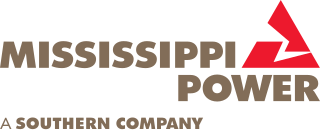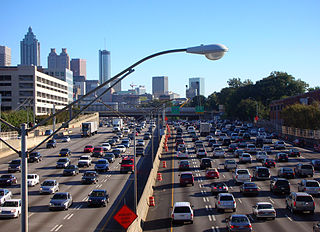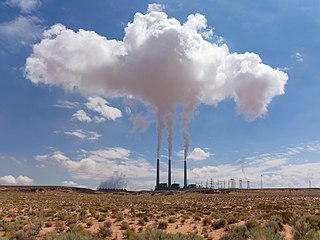
The Federal Energy Regulatory Commission (FERC) is the United States federal agency that regulates the transmission and wholesale sale of electricity and natural gas in interstate commerce and regulates the transportation of oil by pipeline in interstate commerce. FERC also reviews proposals to build interstate natural gas pipelines, natural gas storage projects, and liquefied natural gas (LNG) terminals, in addition to licensing non-federal hydropower projects.

FirstEnergy Corp is an electric utility headquartered in Akron, Ohio. It was established when Ohio Edison merged with Centerior Energy in 1997. Its subsidiaries and affiliates are involved in the distribution, transmission, and generation of electricity, as well as energy management and other energy-related services. Its ten electric utility operating companies comprise one of the United States' largest investor-owned utilities, based on serving 6 million customers within a 65,000-square-mile (170,000 km2) area of Ohio, Pennsylvania, West Virginia, Virginia, Maryland, New Jersey, and New York. Its generation subsidiaries control more than 16,000 megawatts of capacity, and its distribution lines span over 194,000 miles. In 2018, FirstEnergy ranked 219 on the Fortune 500 list of the largest public corporations in the United States by revenue.
The Florida Public Service Commission (FPSC) regulates investor-owned electric, natural gas, and water and wastewater utilities. The FPSC facilitates competitive markets in the telecommunications industry, has authority over intercarrier disputes, and oversees pay telephones, the federal Lifeline Assistance Program and Telecommunications Relay Service.
The Acid Rain Program is a market-based initiative taken by the United States Environmental Protection Agency in an effort to reduce overall atmospheric levels of sulfur dioxide and nitrogen oxides, which cause acid rain. The program is an implementation of emissions trading that primarily targets coal-burning power plants, allowing them to buy and sell emission permits according to individual needs and costs. In 2011, the trading program that existed since 1995 was supplemented by four separate trading programs under the Cross-State Air Pollution Rule (CSAPR). On August 21, 2012, the United States Court of Appeals for the District of Columbia issued its Opinion and Order in the appeal of the Cross State Air Pollution Rule (CSAPR) for two independent legal reasons. The stay on CSAPR was lifted in October 2014, allowing implementation of the law and its trading programs to begin.

Mississippi Power is an investor-owned electric utility and a wholly owned subsidiary of Atlanta-based Southern Company. Mississippi Power Company (MPC) is headquartered in Gulfport, Mississippi.

The Edison Electric Institute (EEI) is an association that represents all U.S. investor-owned electric companies.

The United States produced 5.2 billion metric tons of carbon dioxide equivalent greenhouse gas (GHG) emissions in 2020, the second largest in the world after greenhouse gas emissions by China and among the countries with the highest greenhouse gas emissions per person. In 2019 China is estimated to have emitted 27% of world GHG, followed by the United States with 11%, then India with 6.6%. In total the United States has emitted a quarter of world GHG, more than any other country. Annual emissions are over 15 tons per person and, amongst the top eight emitters, is the highest country by greenhouse gas emissions per person. However, the IEA estimates that the richest decile in the US emits over 55 tonnes of CO2 per capita each year. Because coal-fired power stations are gradually shutting down, in the 2010s emissions from electricity generation fell to second place behind transportation which is now the largest single source. In 2020, 27% of the GHG emissions of the United States were from transportation, 25% from electricity, 24% from industry, 13% from commercial and residential buildings and 11% from agriculture. In 2021, the electric power sector was the second largest source of U.S. greenhouse gas emissions, accounting for 25% of the U.S. total. These greenhouse gas emissions are contributing to climate change in the United States, as well as worldwide.

Community Choice Aggregation (CCA), also known as Community Choice Energy, municipal aggregation, governmental aggregation, electricity aggregation, and community aggregation, is an alternative to the investor-owned utility energy supply system in which local entities in the United States aggregate the buying power of individual customers within a defined jurisdiction in order to secure alternative energy supply contracts. The CCA chooses the power generation source on behalf of the consumers.
American Clean Skies Foundation (ACSF) is a 501(c)(3) not-for profit organization based in Washington, D.C., United States. It advocates for a cleaner, low-carbon environment through the expanded use of alternative energy sources and energy efficiency. ACSF stopped operations in 2019 pending further funding.

The Clean Air Act (CAA) is the United States' primary federal air quality law, intended to reduce and control air pollution nationwide. Initially enacted in 1963 and amended many times since, it is one of the United States' first and most influential modern environmental laws.
There is a large array of stakeholders that provide services through electricity generation, transmission, distribution and marketing for industrial, commercial, public and residential customers in the United States. It also includes many public institutions that regulate the sector. In 1996, there were 3,195 electric utilities in the United States, of which fewer than 1,000 were engaged in power generation. This leaves a large number of mostly smaller utilities engaged only in power distribution. There were also 65 power marketers. Of all utilities, 2,020 were publicly owned, 932 were rural electric cooperatives, and 243 were investor-owned utilities. The electricity transmission network is controlled by Independent System Operators or Regional Transmission Organizations, which are not-for-profit organizations that are obliged to provide indiscriminate access to various suppliers to promote competition.
Missouri Coalition for the Environment, a non-profit, non-partisan, 501(c)(3) state-level conservation organization, campaigns for clean air, clean water and clean energy in Missouri. The organization is member and grant supported.
The National Association of Regulatory Utility Commissioners (NARUC) is the national association representing the state public service commissioners who regulate essential utility services, including energy, telecommunications, and water. NARUC members are responsible for assuring reliable utility service at fair, just, and reasonable rates. Founded in 1889, the Association is a resource for its members and the regulatory community, providing a venue to set and influence public policy, share best practices, and foster solutions to improve regulation.

The New York Public Service Commission is the public utilities commission of the New York state government that regulates and oversees the electric, gas, water, and telecommunication industries in New York as part of the Department of Public Service. The department's regulations are compiled in title 16 of the New York Codes, Rules and Regulations. The current chairman of the Commission and chief executive of the Department is Rory M. Christian. His term began on June 10, 2021 and runs through February 1, 2027.

Net metering is a policy by many states in the United States designed to help the adoption of renewable energy. Net metering was pioneered in the United States as a way to allow solar and wind to provide electricity whenever available and allow use of that electricity whenever it was needed, beginning with utilities in Idaho in 1980, and in Arizona in 1981. In 1983, Minnesota passed the first state net metering law. As of March 2015, 44 states and Washington, D.C. have developed mandatory net metering rules for at least some utilities. However, although the states' rules are clear, few utilities actually compensate at full retail rates.
The Indiana Utility Regulatory Commission (IURC) is the public utilities commission of the state of Indiana, led by five commissioners appointed by the governor.

The Clean Power Plan was an Obama administration policy aimed at combating anthropogenic climate change that was first proposed by the Environmental Protection Agency (EPA) in June 2014. The final version of the plan was unveiled by President Obama on August 3, 2015. Each state was assigned an individual goal for reducing carbon emissions, which could be accomplished how they saw fit, but with the possibility of the EPA stepping in if the state refused to submit a plan. If every state met its target, the plan was projected to reduce carbon emissions from electricity generation 32% by 2030, relative to 2005 levels, as well as achieving various health benefits due to reduced air pollution.

The environmental policy of the Donald Trump administration represented a shift from the policy priorities and goals of the preceding Barack Obama administration. Where President Obama's environmental agenda prioritized the reduction of carbon emissions through the use of renewable energy with the goal of conserving the environment for future generations, the Trump administration policy was for the US to attain energy independence based on fossil fuel use and to rescind many environmental regulations. By the end of Trump's term, his administration had rolled back 98 environmental rules and regulations, leaving an additional 14 rollbacks still in progress. As of early 2021, the Biden administration was making a public accounting of regulatory decisions under the Trump administration that had been influenced by politics rather than science.